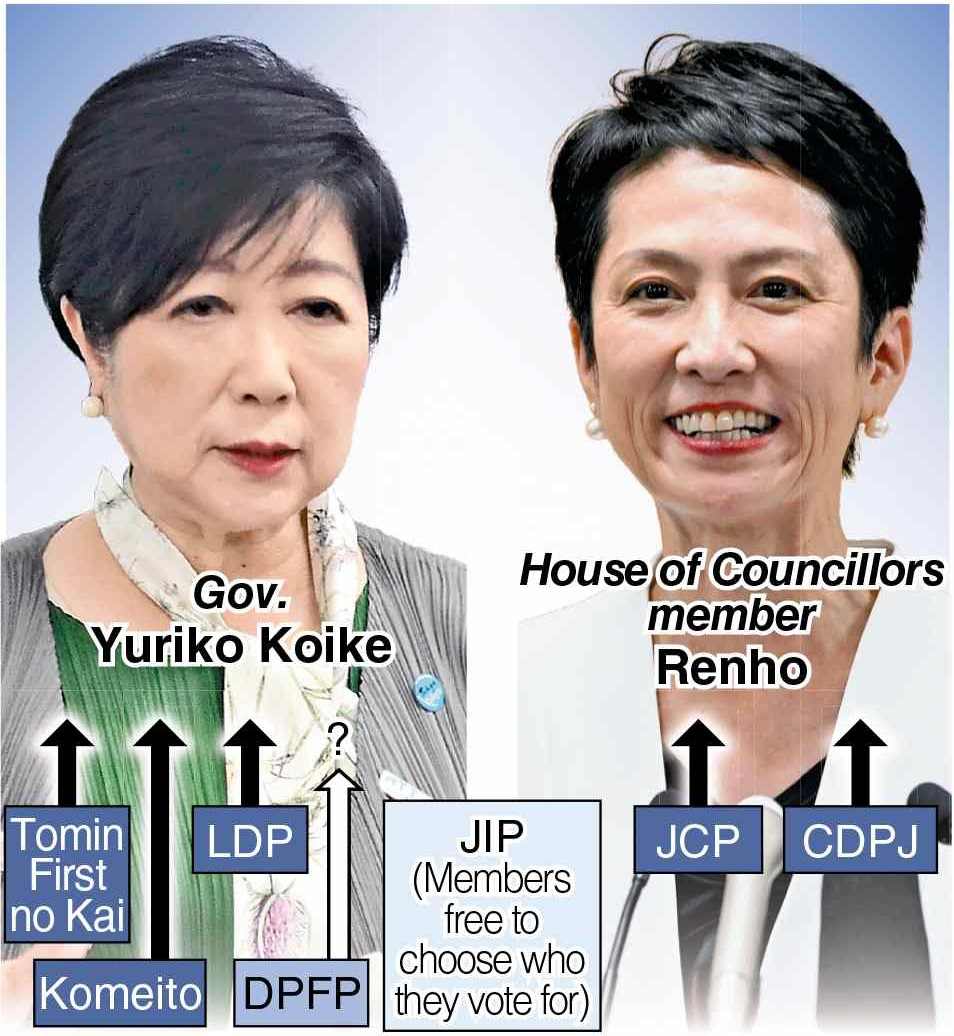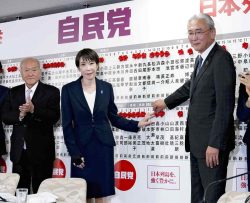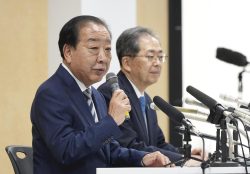Koike Keeps Distance From LDP in Tokyo Gubernatorial Election; Campaign Shaping Up to Be Two-Horse Race Against Renho

Political parties’ support for main candidates in Tokyo gubernatorial election
6:00 JST, June 14, 2024
The upcoming Tokyo gubernatorial election is shaping up to be a two-horse race, and the calculations of both ruling and opposition parties are likely to heavily shape the election campaign.
Tokyo Gov. Yuriko Koike announced Wednesday that she would seek a third term as the capital’s leader. House of Councillors member Renho appears to be Koike’s main rival in the July 7 election, which will hinge largely on how voters perceive the governor’s eight years in charge of the metropolitan government.
Wednesday was the final day of the Tokyo Metropolitan Assembly’s regular session. At the end of the day’s plenary meeting, Koike took the stage and announced her determination to run in the gubernatorial election.
“I’ll dedicate myself to advancing the administration of the capital for Tokyoites and with Tokyoites,” Koike said.
Koike was first elected governor in July 2016. She adeptly handled a string of issues during her first term, including swiftly deciding to delay the Tsukiji market’s planned relocation to Toyosu because of contaminated soil at the new site, and reviewing some Tokyo Olympic and Paralympic venues in an effort to rein in soaring costs. Her second term was dominated by overseeing the Tokyo Games and dealing with the COVID-19 pandemic.
After announcing her candidacy, Koike told reporters she intended to continue tackling issues including the graying and declining population, natural disasters and urban development. Asked about election pledges, Koike replied: “In a nutshell, I will protect the capital. That means protecting lives, livelihoods and the economy, and taking steps that lead to sustainable growth.” Koike was to announce details of her policies soon.
Avoiding ‘loss by default’
Koike, 71, plans to run as an independent. She initially considered accepting the well-organized support of the Liberal Democratic Party and Komeito during the campaign. However, revelations that several LDP factions have been involved in a political funds scandal has sparked growing public displeasure with the ruling party, so Koike decided gaining the support of voters would be easier if she did not seek the recommendation of a political party.
Despite this, the LDP is keen to avoid a “loss by default.” The party’s federation of Tokyo metropolitan branches decided at a meeting Monday to “fully support” Koike in the election. In a show of consideration to Koike’s desire to avoid being colored by a political party’s brush, the LDP is expected to participate as a “recognized organization” that can conduct political activities during the election campaign.
The LDP’s decision to put off recommending a candidate Koike had backed in April’s House of Representatives by-election for Tokyo Constituency No. 15 resulted in the party’s votes being scattered among various candidates.
“The party must be prepared to provide support as an organization if we want to make this a contest we can win,” a senior LDP official told The Yomiuri Shimbun.
Komeito Secretary General Keiichi Ishii, whose party has cordial ties with Koike in the Tokyo Metropolitan Assembly, also said on a radio program Tuesday that his party’s participation as a “recognized organization” was an option. “We’ll support her of our own accord,” Ishii said.
Tomin First no Kai (Tokyoites first group), a regional political party to which Koike serves as a special adviser, also plans to throw its weight behind her candidacy. Each of these parties likely will support Koike on their own initiative.
Renho tones down comments
Renho submitted a letter of resignation from the Constitutional Democratic Party of Japan on Wednesday. “I am a contender,” a stern-faced Renho said to reporters that day. “I want to bring a fresh approach.”
When Renho officially announced her candidacy on May 27, she initially stated she would “reset” the Tokyo government run by Koike, whom she said was “helping to keep the LDP government afloat.” However, her criticism of popular policies such as child-rearing support sparked pushback from many Tokyoites. Since then, Renho, 56, has toned down her language in public speeches and other situations. She has quietly stopped using the word “reset.”
The CDPJ drew up a strategy through which the party would help Renho, its foremost debater, sweep to victory in the Tokyo election, and then build on this momentum for the next House of Representatives election. At a party meeting Wednesday, CDPJ Diet Affairs Committee Chairperson Jun Azumi said, “We must make this an election in which the residents of Tokyo deliver a verdict on the ‘money and politics’ scandals.”
The Japanese Communist Party also has announced its full support for Renho. The JCP aims to make its presence felt to the CDPJ as the opposition parties inch toward potential collaboration in the next lower house election. The opposition Social Democratic Party also will back Renho.
However, the Democratic Party for the People is reluctant to work closely with the JCP and could swing in behind Koike. The Japanese Trade Union Confederation (Rengo), a group that supports the DPFP, also is considering offering support to the incumbent. The Japan Innovation Party opted against fielding a candidate after deciding no one was suitable.
“If we’d forced ourselves to put forward a candidate, it could’ve taken away some of Ms. Koike’s votes,” a senior JIP official admitted. “This time, we decided to let her owe us one.”
Web: Koike Keeps Distance From LDP in Tokyo Gubernatorial Election; Campaign Shaping Up to Be Two-Horse Race Against Renho
Top Articles in Politics
-

Japan PM Takaichi’s Cabinet Resigns en Masse
-

Sanae Takaichi Elected Prime Minister of Japan; Keeps All Cabinet Appointees from Previous Term
-

Japan’s Govt to Submit Road Map for Growth Strategy in March, PM Takaichi to Announce in Upcoming Policy Speech
-

LDP Wins Historic Landslide Victory
-

LDP Wins Landslide Victory, Secures Single-party Majority; Ruling Coalition with JIP Poised to Secure Over 300 seats (UPDATE 1)
JN ACCESS RANKING
-

Japan PM Takaichi’s Cabinet Resigns en Masse
-

Japan Institute to Use Domestic Commercial Optical Lattice Clock to Set Japan Standard Time
-

Israeli Ambassador to Japan Speaks about Japan’s Role in the Reconstruction of Gaza
-

Man Infected with Measles Reportedly Dined at Restaurant in Tokyo Station
-

Videos Plagiarized, Reposted with False Subtitles Claiming ‘Ryukyu Belongs to China’; Anti-China False Information Also Posted in Japan























